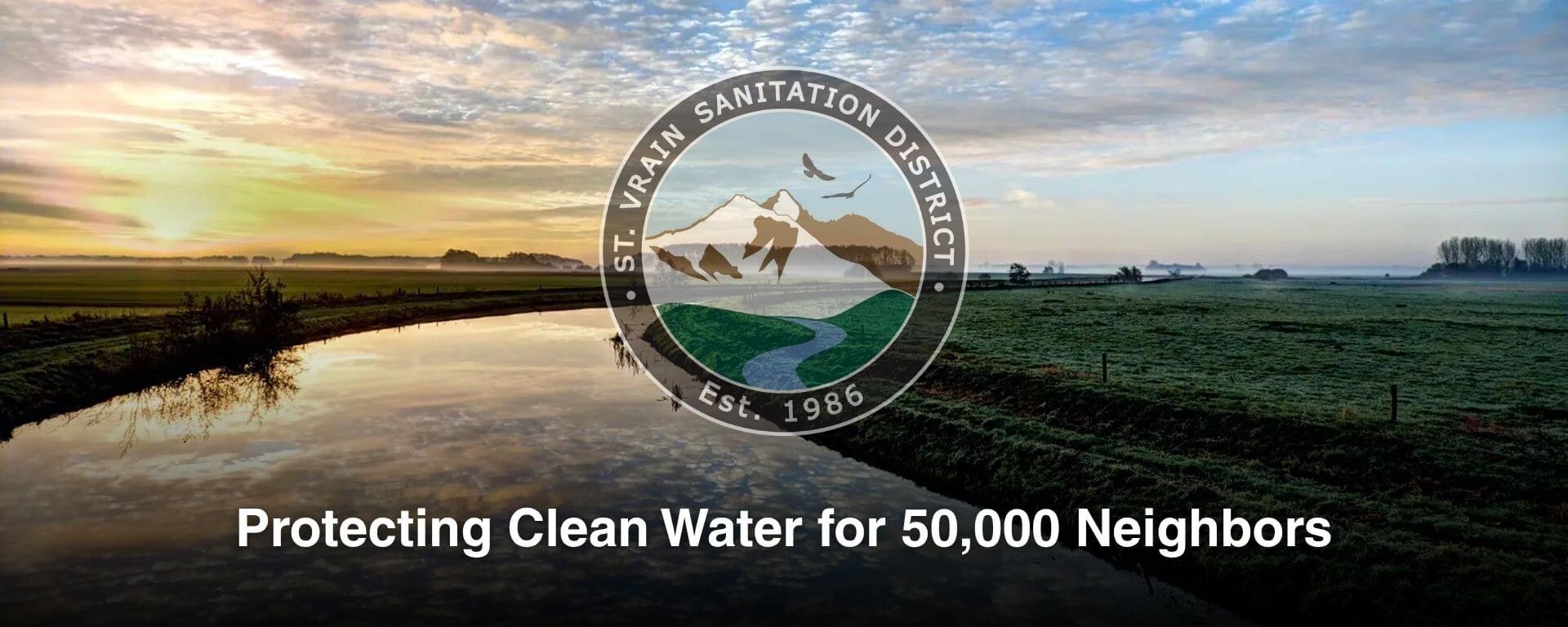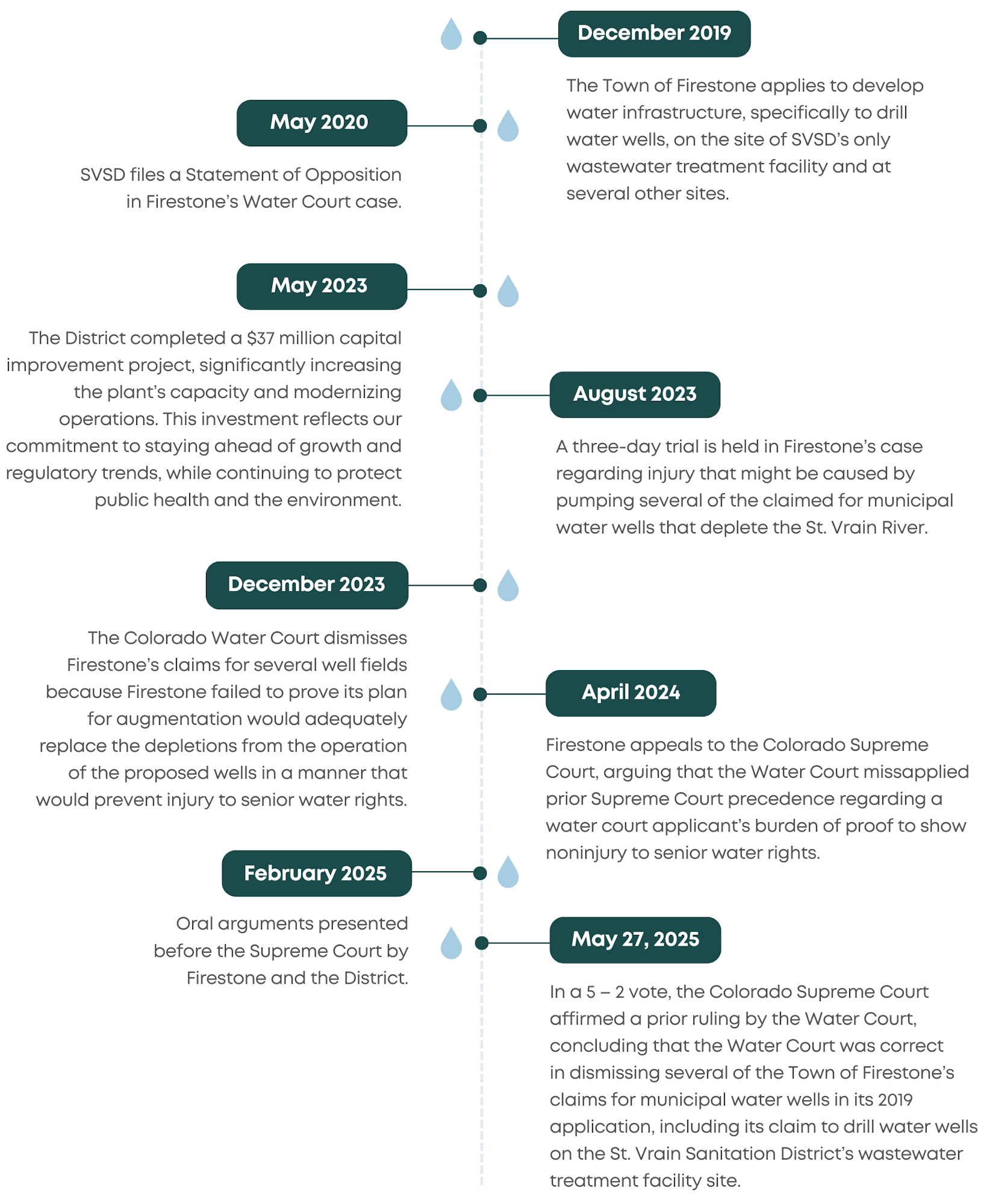Get the Facts About Your Service and District Operations

The Town of Firestone has filed to acquire a portion of SVSD-owned land through eminent domain for a proposed water project. SVSD has designated this land for critical future wastewater infrastructure and believes there are more collaborative paths forward that preserve public trust, infrastructure integrity, and long-term planning among public agencies.
The land is part of SVSD’s current treatment plant property and has been intentionally reserved for future expansion. It is essential to SVSD’s long-term capacity planning and service to a growing regional population.
Yes. Over the past five years, SVSD has taken all appropriate legal and procedural steps, including reviewing Firestone’s proposals, commissioning independent appraisals, and offering to collaborate. Despite this, Firestone has escalated the issue through legal action, including filing for condemnation after a similar attempt to gain access through the water Court was rejected by the Colorado Supreme Court.
Yes. There are several other locations that could support the proposed well without impacting essential wastewater infrastructure. SVSD continues to believe that alternative siting, paired with regional coordination, is the most responsible and least disruptive path forward.
This case involves one public agency seeking to condemn land from another for a project that does not yet have a final, decreed water right. The land in question is central to SVSD’s ability to serve more than 50,000 residents, and the situation raises broader concerns about how public entities should work together when planning for future infrastructure.
No. SVSD’s wastewater services will continue uninterrupted. However, any loss of land designated for future use could limit SVSD’s ability to expand efficiently, potentially affecting long-term service reliability and affordability.
SVSD is responding through the appropriate legal channels and continues to prioritize transparency, public health, and responsible land use. Our focus is on protecting infrastructure that serves the greater good, today and into the future.
On May 27th, 2025, the Colorado Supreme Court affirmed a prior ruling by the Water Court, concluding that the Town of Firestone’s 2019 application for water wells to be located on the St. Vrain Sanitation District’s wastewater treatment facility site should be denied. The decision supports the District’s responsibility to preserve and protect critical infrastructure for long-term public service.
This is the District’s only treatment facility, and it serves over 15,000 customer accounts, including residents, businesses, and public institutions, across a rapidly growing region. The site is essential to the District’s ability to continue delivering high-quality, compliant, and environmentally responsible wastewater treatment for decades to come.
The Court affirmed that Firestone failed to provide sufficiently reliable evidence to prove non-injury to senior water rights from operation of the proposed municipal water wells. Firestone’s failure in large part stemmed from Firestone’s refusal to provide more specific locations for the wells.
The decision protects Colorado’s water supplies, a public resource, and will help the District protect its treatment site for future facility expansions necessitated by the growth of Firestone and the other communities in the region. If the District is ultimately successful in protecting its site, that will assist the District to keep sewer rates stable and affordable by avoiding costly alternative expansions.
Reliable wastewater treatment directly supports public health, maintains water quality, protects local ecosystems, and preserves our community’s overall quality of life for generations.
Ensuring proper wastewater infrastructure protects local streams, rivers, and wildlife habitats from potential contamination or depletion resulting from poorly planned groundwater extraction.
Firestone’s application lacked specific details on exact well locations for three proposed well fields, making it impossible to confidently predict potential impacts on existing senior water rights holders.
No. The Colorado Supreme Court Justices were split 5–2, with the majority voting to uphold the Water Court’s ruling to dismiss several of Firestone’s claims for municipal water supply wells based on injury grounds.
No. Firestone can still pursue groundwater wells anywhere they choose, but they must demonstrate with reliable evidence that pumping those wells will not injure existing water rights.
Absolutely. SVSD remains committed to responsible and transparent collaboration with Firestone and other regional partners to ensure sustainable water resource planning and community growth.
Yes, and we continue to. The District has been consistent in its message: we are open to constructive conversations and future-oriented solutions. But we also have a responsibility to protect the one site that makes regional wastewater treatment possible. Any approach that limits that mission, even unintentionally, must be avoided. There are likely other, more appropriate locations where the Town’s water goals can be achieved without putting critical wastewater infrastructure at risk. We welcome a collaborative path forward that balances both needs.
The District so far has been able to defend itself in the litigation without raising its rates. If the District is ultimately unsuccessful in protecting its ability to expand its facilities at the current plant site, the District very likely will need a significant rate increases to obtain replacement land for additional the infrastructure necessary to meet the forecasted increased demand for wastewater service.
The District’s priority is to ensure uninterrupted, high-quality, affordable service now and into the future. Protecting the treatment facility site is central to that goal. By planning ahead and preserving space for necessary infrastructure, we’re working to stay ahead of demand and avoid capacity challenges down the line. We believe that thoughtful, coordinated planning with regional partners is the best way to support growth while maintaining reliable public services.
The communities we serve (including Dacono, Firestone, Frederick, portions of Mead, eastern Longmont, and surrounding areas in Weld County) are growing quickly. With that growth comes greater demand for safe, reliable wastewater treatment. Our projections are based on regional planning data and reflect our responsibility to stay ahead of that demand, not just for today, but for the next generation.
In 2023, the District completed a $37 million capital improvement project, significantly increasing the plant’s capacity and modernizing operations. This investment reflects our commitment to staying ahead of growth and regulatory trends, while continuing to protect public health and the environment.

